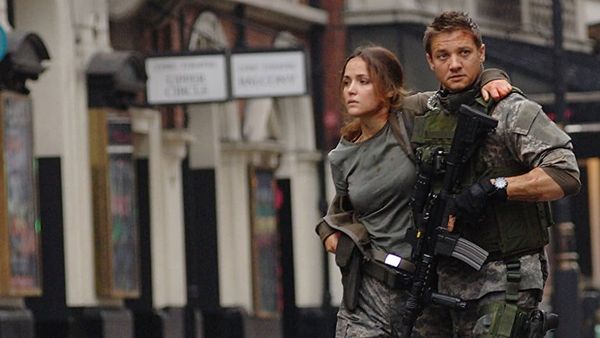Eye For Film >> Movies >> 28 Weeks Later (2007) Film Review

Back in the Fifties and Sixties, with the British Empire crumbling, the Cold War in full swing and nuclear devastation only a button away, this sceptred isle seemed to be a cinematic epicentre for world-shaking horror. Time and again in the Quatermass series, as well as in films like The Day Of The Triffids (1962) and Doctor Who And The Daleks (1965), the people of England would face deadly viruses and alien menaces, with nothing more than some DIY technology and a stiff upper lip to see them through to the following morning. Apparently their plucky heroics were enough to lift this nation from the risk of total destruction, as the next few decades would see the English cinemagoer's brow ruffled only by period drama, kitchen sink realism, mild sex comedy - and maybe the odd Hammer vampire.
The 11th of September 2001 was to change all that, as a new terror emerged in America that would send ripples of anxiety across the Atlantic, and this was reflected in British cinema, which began once again to imagine apocalypse in England. There have been Children Of Men (2006) and Sunshine (2007), as well as comedies like Shaun Of The Dead (2004) and League of Gentlemen's Apocalypse (2005), and Irish variants like Dead Meat (2004) and Isolation (2005) - but the film that ushered in this new run of 'British Armageddon' films, as well as triggering the whole zombie genre revival, was Danny Boyle's 28 Days Later... (2002), which took the unfocused rage infecting the whole Western world in the immediate aftermath of 9/11 and turned it into grim end-of-days horror in a determinedly English setting.

A sequel seemed inevitable, and if 28 Weeks Later... comes, despite its title, five long years later, this hiatus ensures that the follow-up film can resonate with all manner of events to have blighted the world since the original was first splattered all over our screens. The debacle of the US-led occupation of Iraq, the cataclysm of Hurricane Katrina, and the spectre of the SARS epidemic - these all infect the plotting and imagery of 28 Weeks Later..., investing its fubar scenarios with an alarming plausibility that is only enhanced by the documentary style of shooting, all handheld and up close.
After a brief prologue, set at roughly the same time as the events of the first film, in which Don (Robert Carlyle) sees his wife Alice (Catherine McCormack) trapped by a mob of the infected, and barely manages to escape alone with his own life, the film cuts ahead to 28 weeks later. All of mainland Britain has long since been totally quarantined, the infected have died out, and a NATO force, led by the American military, has begun the long process of clearing London for repopulation. Don is amongst the first refugees to move into the heavily protected 'Green Zone' on London's Isle of Dogs. Reunited at last with his children, Andy (Mackintosh Muggleton) and Tammy (Imogen Poots), he must try to find a way to tell them about the traumatic circumstances of their mother's death and his own not entirely honorable rôle in it.
The two children sneak off to their old home in what is now an off-limits area of London, hoping to find there a photo of Alice - but they find much more than that, and as the infection once again begins spreading through the city with astonishing rapidity, the two children must race against all hope to survive together, with only a Chief Medical Officer (Rose Byrne), a sniper gone AWOL (Jeremy Renner) and a conflicted helicopter pilot (Harold Perrineau) to save them from enraged zombies, genocidal soldiers - and themselves.
Alex Garland may have helped sketch the basic story outline, and Danny Boyle may have contributed a few days of second-unit direction (for the opening scenes, set within the first 28 days of the outbreak), but otherwise the writer-director duo who brought us the original film have taken the 'executive producer' backseat and invited fresh blood for this sequel. At first the teaming up of Juan Carlos Fresnadillo (director of 2002's Intacto) with writers (and fellow Spaniards) Enrique López Lavigne and Jesús Olmo, as well as Rowan Joffe (writer of 2000's Last Resort), might seem bizarre for a London-set zombie flick - but then who would have expected back in 2002 that Garland and Boyle, whose previous collaboration had been the decidedly lukewarm The Beach (2000), would prove so ideal a pairing for the original?
The truth is that 28 Weeks Later... makes for scorching horror. Like the original, it offers a perfect blend of well-drawn characters, political allegory, grand guignol, flesh-crawling tension and very fast-moving zombies - all presented in a hyperrealist mode and edited with such wrenching violence that you will think you have seen far more than has actually been shown on screen. Also like the original, 28 Weeks Later... wears its influences on its bloody sleeve, paying allusive homage to the many films that have inspired it (especially George A. Romero's genre-defining zombie trilogy) - and with its scenes of civilians being trapped and slaughtered inside a city fortress, it also references other zombie sequels that have come out since the occupation of Iraq, like Resident Evil: Apocalypse (2004) and Romero's Land Of The Dead (2005).
No doubt much ink will be spilt about the film's graphic portrayal of American forces getting bogged down in something far bigger than they can properly manage - but what is more interesting (and more subtle) is its dramatisation of how normal values (within society, and within the family) can quickly become an irrelevance when circumstances get extreme enough. The US military outfit, led by General Stone (Idris Elba), may run itself along quasi-fascist lines, deeming civilians to be expendable 'collateral damage', or even legitimate targets, all in the service of containing a potentially world-consuming threat. Here, however, unlike in Wolfgang Petersen's otherwise similar Outbreak (1995), the uncomfortable horror that emerges is that the military may actually be right, and that anyone bold enough to resist their drastic policy may end up being the real danger. All this is not so much to celebrate right-winged military agendas, as to reflect tragically upon the world order we now live in, and the humanity we have sacrificed to achieve it.
Bleak is the word. If 28 Days Later... was criticised in some quarters for its 'happy' ending, then by contrast the sequel leaves no margin for optimism. Fast and furious, gory and grim, 28 Weeks Later... is an unmissable zombie holocaust. Missing it would be like sleeping through world's end.
Reviewed on: 08 May 2007




















